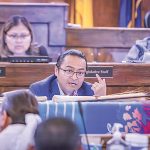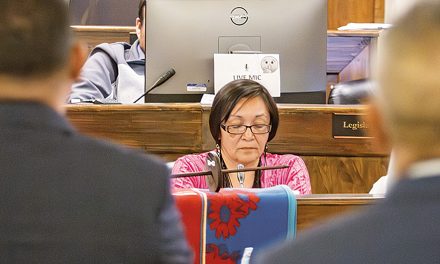
Council hopes to avoid last year’s budget mess
WINDOW ROCK
Navajo Nation budget season will soon be underway, and the projected general fund revenue for the fiscal 2022 comprehensive budget is $137 million.
During Budget and Finance’s Tuesday committee meeting, Controller Pearline Kirk explained the general fund revenue projection is $187.3 million, an increase of nearly $29 million over the present year’s, but approximately $50.1 million of this is mandatory set-asides, which leaves the Nation with approximately $137.2 million.
But the Navajo Nation Council’s main concern is avoiding issues from last year’s problematic budget season.
During the 2021 budget season, the Navajo Nation was trying to combat the COVID-19 pandemic. As government offices closed, Council began meeting through teleconference, making everything more difficult.
Then the whopping and unexpected Coronavirus Aid, Relief and Economic Security Act funding, with its end-of-year spending deadline, took precedence over establishing a comprehensive budget for the Navajo Nation.
In the end, Council voted swiftly on a continuing resolution to carry through the fiscal year, which they hope to avoid this year.
“What are the possibilities of trying to get the three branch chiefs to spearhead and think about getting this budget completed before September 30?” asked Budget and Finance Vice Chair Ray Smith. “I know we did a continuing resolution,” he said. “We hurt veterans, hurt programs. How are we going to even have a comprehensive budget by September with all of this going on?”
What Smith is referring to is the American Relief Plan Act funding, which will dwarf the CARES Act and is due any time now. The difference between the CARES funding, that was distributed last spring, and ARPA is the deadline to spend these dollars. With the CARES funding, the Nation had only a few months to spend the over $700 million.
But, when it comes to ARPA, the Navajo Nation will have until 2024 to spend those dollars. Dominic Beyal, director of the Office of Management and Budget, presented a budget calendar to Budget and Finance during the committee’s Tuesday meeting and said if OMB’s recommended calendar is followed then Council will be able to approve a budget weeks sooner than last year.
“My recommendation would be exactly what we are looking at right now,” said Beyal. “A calendar that starts on time. This particular process would start as soon as next week with the preliminary work … which is the same general time frame of the fiscal year 2019 budget process. This schedule would return to the more typical time frame.”
He further said that working on both ARPA and the comprehensive budget simultaneously wouldn’t be ideal, and possibly another continuing resolution might be the route to go.
But a continuing resolution isn’t an ideal option for OMB. “In my office in general…we don’t like CRs,” said Beyal.
“They’re kind of difficult to work with because all you are doing is saying the prior year’s funding level, carry it forward. There’s pros and cons to it.” During spring session, Navajo Nation Council approved a five-year expenditure plan for interest income from the permanent fund, which includes $40 million for each fiscal year from 2022 to 2026.
Currently, the resolution is being considered by President Jonathan Nez. This legislation states that the closure of the Navajo Generation Station and Kayenta Coal Mine, and other revenue sources, will result in significant revenue shortfall for the future and may lead to reduction in services.
The proposed five-year plan allows the Nation to replace lost revenues with the interest from the permanent fund, which was established precisely for this type of “rainy day.” Kirk noted there is also a $20 million reserve in the undesignated unreserved fund balance that is available for this budget cycle.
Another aspect to consider is that the permanent fund income is subject to an audit and other calculations.
“We are at that point now where the purpose and the intent of this permanent fund, to replace the revenue stream from natural resources, is before us now,” said Martin Ashley, director for Navajo Tax Commission, during the Council’s spring session.








 Highway 264,
Highway 264, I-40, WB @ Winslow
I-40, WB @ Winslow